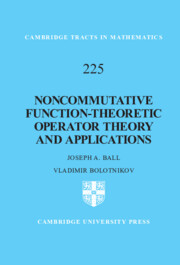Book contents
- Frontmatter
- Contents
- Preface
- Acknowledgments
- 1 Introduction
- 2 Formal Reproducing Kernel Hilbert Spaces
- 3 Contractive Multipliers
- 4 Stein Relations and Observability Range Spaces
- 5 Beurling–Lax Theorems Based on Contractive Multipliers
- 6 Non-orthogonal Beurling–Lax Representations Based on Wandering Subspaces
- 7 Orthogonal Beurling–Lax Representations Based on Wandering Subspaces
- 8 Models for ω-Hypercontractive Operator Tuples
- 9 Weighted Hardy–Fock Spaces Built from a Regular Formal Power Series
- References
- Notation Index
- Subject Index
3 - Contractive Multipliers
Published online by Cambridge University Press: 09 December 2021
- Frontmatter
- Contents
- Preface
- Acknowledgments
- 1 Introduction
- 2 Formal Reproducing Kernel Hilbert Spaces
- 3 Contractive Multipliers
- 4 Stein Relations and Observability Range Spaces
- 5 Beurling–Lax Theorems Based on Contractive Multipliers
- 6 Non-orthogonal Beurling–Lax Representations Based on Wandering Subspaces
- 7 Orthogonal Beurling–Lax Representations Based on Wandering Subspaces
- 8 Models for ω-Hypercontractive Operator Tuples
- 9 Weighted Hardy–Fock Spaces Built from a Regular Formal Power Series
- References
- Notation Index
- Subject Index
Summary
Chapter 3 introduces the notion of a contractive multiplier between weighted Hardy–Fock spaces (the analog of a Schur-class function for the classical setting). Unlike the classical case, in this general setting the notion of inner partitions into a number of distinct cases: (i) strictly inner (isometric multiplier) (ii) McCT (McCullough-Trent) inner (partially isometric multiplier), (iii) Bergman inner (contractive multiplier which is isometric when restricted to constants). For appropriately restricted pairs of input/output vectorial weighted Hardy–Fock spaces, analogs of the classical connections with dissipative/conservative linear input/state/output multidimensional linear systems, kernel decompositions, as well as corresponding generalized orthogonal decompositions of the ambient weighted Hardy–Fock space as a sum of a backward and a forward-shift-invariant subspace, are explored. These results are fundamental for the work of the succeeding Chapters.
Keywords
Information
- Type
- Chapter
- Information
- Publisher: Cambridge University PressPrint publication year: 2021
